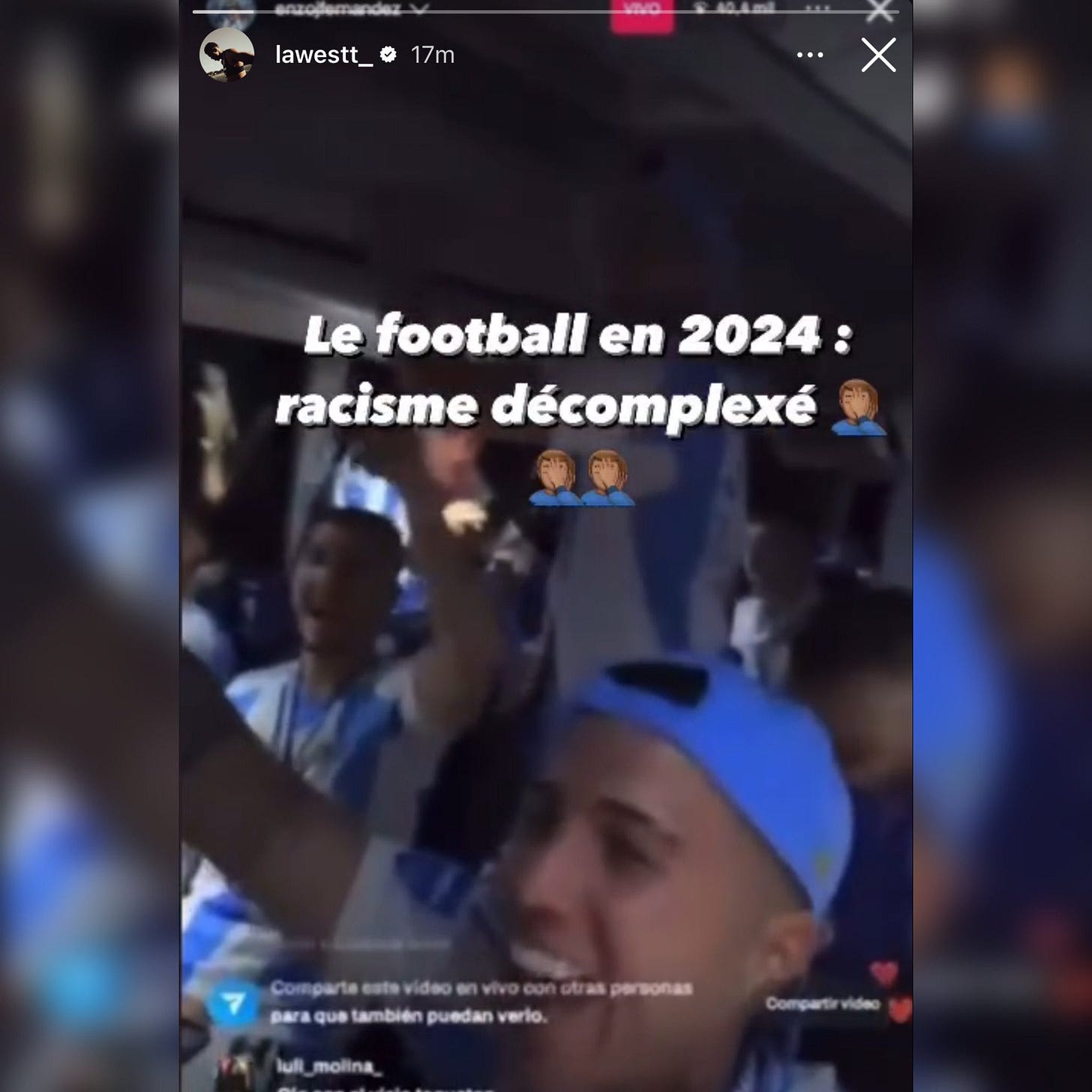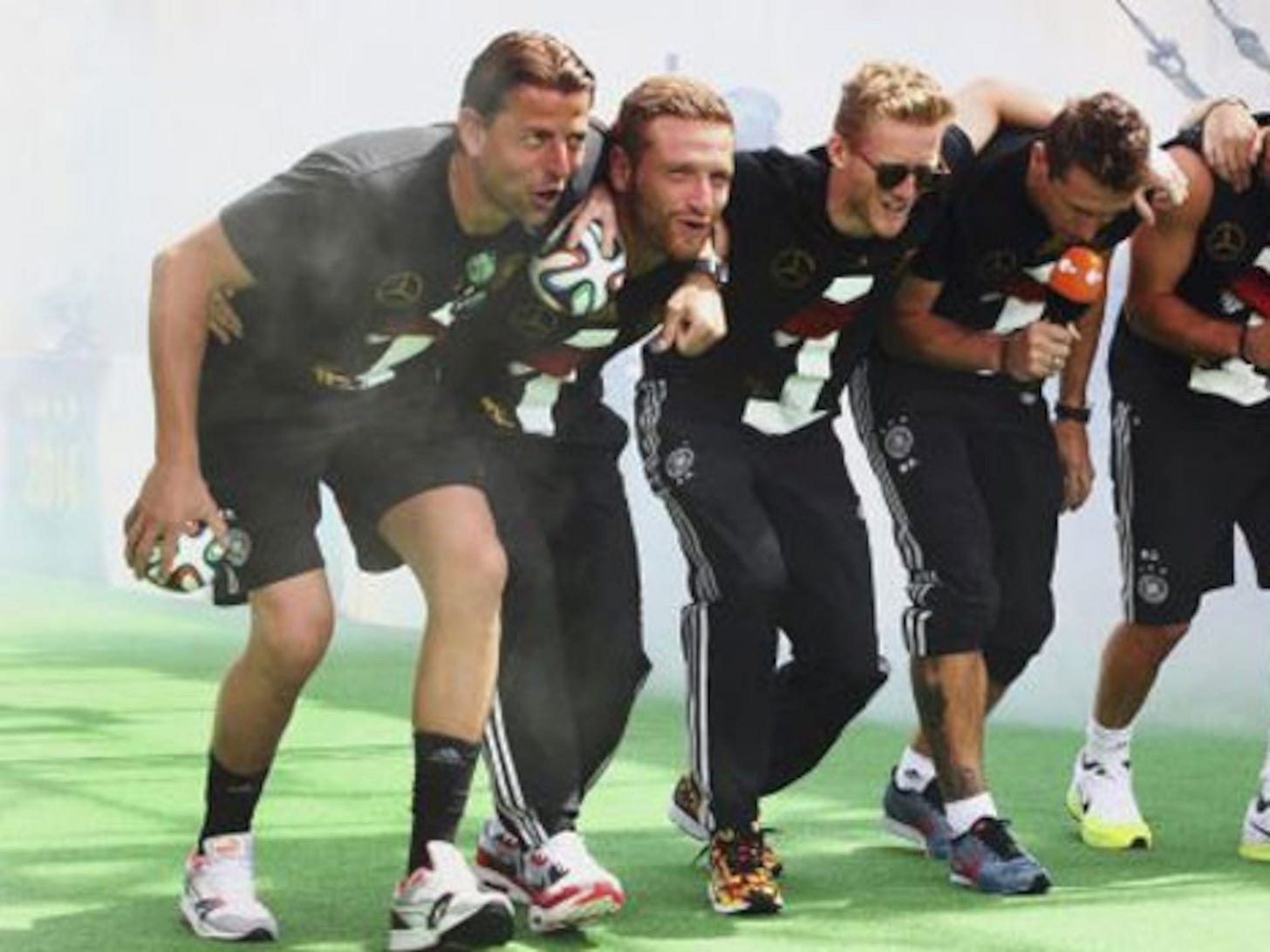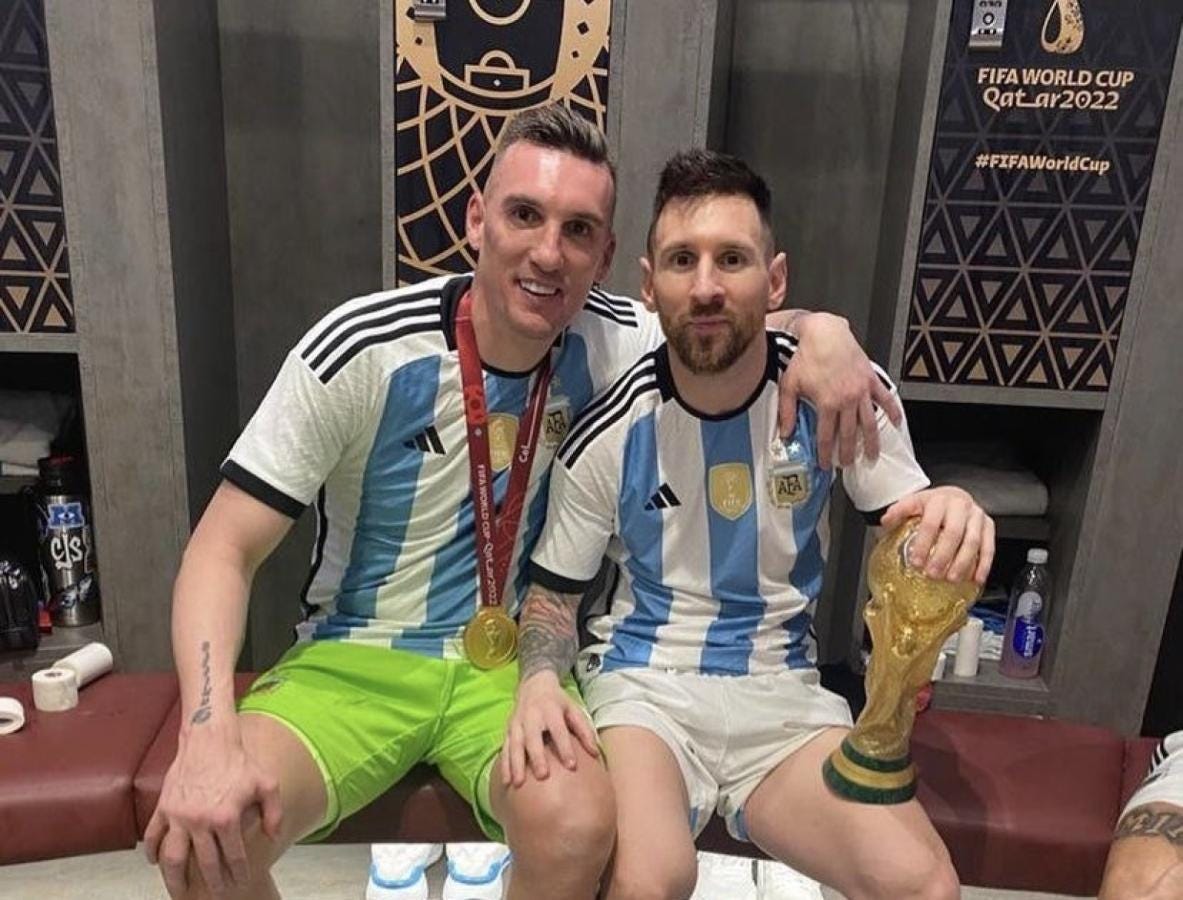Warning: today's article is (much) longer than usual. That's why I included a summary of less than 500 characters at the end. However, I think you should read it because I was careful not to write it as ‘6 communication lessons from the Enzogate’.
Warning 2: in this article I am not interested in commenting on how things should be, but rather in trying to understand how things are in order to think about how they could be. I do not believe that the world is black and white, but that there are infinite variations of grey. If your thinking tends to be more in absolutes, between right and wrong, like a Sith, you probably won't like this article.
Did you ever see one of those videos where a man (adult or child) starts digging a hole on the beach and, little by little, other men start to arrive to help him dig the hole?
If you haven't seen it, here is a screenshot of a Tiktok, so you can see that I didn't make it up.
What the well-diggers seem to be unaware of (or choose to ignore) is the danger this activity poses. Several people, mainly children, have died buried in sand pits.
At the Copa America celebrations that Argentina won in the United States, Enzo Fernandez started digging a hole, not realising that he was sinking himself. When he was warned of the mistake of what he was doing, he decided to repent, but there was a new problem. Many people saw him digging the hole and decided to join in. And while they are all convinced that they are helping him, in reality they are sinking him deeper and deeper.
But let's take it one step at a time.
What happened?
On Sunday 14 July, Argentina beat Colombia to win the Copa America for the 16th time in its history, and for the second time in a row. On the bus on the way to the hotel, Enzo Fernandez, Argentina's starting midfielder and Chelsea player, decided to do an Instagram live to share the players' celebration.
What you get to hear is the start of a song saying ‘Listen, run the ball, they play in France, but they're all from Angola’ before Fernandez cuts the stream.
The first public figure to react was Wesley Fofana, Enzo's Chelsea teammate, French national team player and son of an Ivorian. Fofana accused Fernandez of racism and unfollowed him on social media, as did a number of Chelsea players (David Datro Fofana, Malang Sarr, Armando Broja, Benoit Badiashile, Axel Disasi, Romeo Lavia, Malo Gusto, Christopher Nkunku and Lesley Ugochukwu). Also supporting Fofana's message were French Barcelona player Jules Koundé and the French football federation.
Enzo Fernandez, for his part, quickly issued a statement in English apologising for the song and called for silence. In his defence came two Chelsea players (Ecuadorian Moisés Caicedo and Senegalese Nicolas Jackson), the father of the little black boy Enzo had played with in a post-match, some of his Argentina teammates who were not on the bus when Enzo did the Instagram live (Alexis Mac Allister and Rodrigo De Paul) and an army of trolls, including members of the Argentine government.
This situation gave rise to seven main problems, some more obvious than others.
Problem n°1: The chant.
The first problem is the song, that's for sure. It should not have been sung in public or in private. The players will most likely never sing it again, thanks to the effect this scandal is having and will have. But this is only a superficial problem.
The deeper problem is that the general public does not consider this song to be racist. First, because they feel that the African origin of the players is a reality and, therefore, not an insult. And second, because the attack is supposed to be directed at the ‘pure’ French who had to go to their colonies for reinforcements (although the song talks about Angola and Nigeria, which were not French colonies).
So, even if this song is stopped, other songs will emerge, probably equally or even more racist and homophobic.
Therefore, the ban is only a patch, it does not work on the real problem.
Problem n°2: The reaction.
Fofana and the rest of the French players (and other affected people) are absolutely right to feel attacked and nobody can complain about their attitude, because it is a very sensitive issue for them.
But I'm going to walk on thin ice and say that, even if they are right, their reaction will only hurt them in their fight against racism.
The growth of far-right movements around the world, and in France in particular, are no longer isolated cases. It is a real cultural change and denying or despising it will only make it grow further.
We need to be able to differentiate who is racist out of ignorance (because they don't know that what they are doing/saying is racist or don't understand the effect it has) and who is racist out of conviction. The ignorant racist can be explained, taught and made an ally. The convinced racist cannot.
I am not saying anything new either. It is what Nelson Mandela did to end Apartheid. He differentiated between different types of racists and convinced the moderates.
Problem n°3: The clash of cultures.
Globalisation and technology have the dual power to teach us how similar all human beings are, but also to enhance differences.
While there was a time when everything seemed to be moving towards cultural homogenisation, this is no longer the case.
Outside the centre, which is Europe, there is a tiredness of being told how to be. They see it as cultural subjugation. Brazilians are tired of being told they can't dance and Argentines are tired of being told how to celebrate.
As you may have noticed, Argentines like to make fun of others in triumph. Although this is seen as distasteful all over the world, it is not in Argentina. They consider it part of the game, part of folklore. Many people find this the most fun part of the game. It's not xenophobic, because it's also done between the different local teams. The loser usually takes it with humour and has a response prepared.
Even the official club accounts make fun of other teams. Recently, Boca Juniors could not register their new players for Copa Sudamericana because they got confused with the time zone in Paraguay (where Conmebol's headquarters are located). Sacachispas, a team from the Argentinian lower division, made fun of it on Twitter.
Europeans don't get this and Argentinians won't change it. But it is not the only culture clash that generates friction.
Three years ago, the Premier League suspended Edinson Cavani for three games and fined him £100,000 for saying ‘Thank you, negrito’ to a friend. ‘Negrito’ may be used as an insult, but in South America it is also an affectionate word, like the context in which Cavani used it.
Britain's uncompromising condemnation did not help. If South American fans feel attacked, they fight back, and they fight back with something that hurts. If they see that racism hurts in Europe, they will attack with racism.
It's obviously wrong, but my aim here is not to point out what is right and what is wrong, but to understand the problem in order to understand if the answers are solutions or if they are just acting.
Problem n°4: The depreciation of truth.
Truth no longer matters. What matters is what is believed. Something will be found to justify it.
Since Enzo Fernández went live on Instagram, all sorts of things have been said that have nothing to do with reality or, at the very least, with the subject in question.
A lot of people end up getting worked up not because of the original topic, but because of something someone else said and end up inventing a narrative that is not at all aligned with what is happening.
For example, on the Argentine side, several tweeters brought up a controversial video of the Germans celebrating the 2014 World Cup, which they won against Argentina. In this video, the Germans walked crouched down and sang ‘’So walk the gauchos‘’ and then stood up and sang ‘’So walks Germany‘’. Argentinian tweeters claimed that no Argentinians reacted to this video because, although it was racist, they considered it part of folklore. Among the tweeters was Enzo Fernandez's father.
This is not true.
A lot of people were angry about the celebration, from journalists and politicians to fans, and even the German government had to apologise to the Argentine government. But this, in the post-truth era, matters little.
Problem n°5: Politicians.
Both the French Football Federation and the Argentine government tried to use the Enzo Fernandez video to score points.
In 2020, Patrice Evra revealed that when the President of France visited the French national team's training camp, the seats were rearranged so that the President was surrounded by white players. The photo of the visit, with the white players in the front rows, confirms the former Manchester United defender's story.
Enzo Fernandez's foolishness gave the FFF a chance to exonerate itself for past mistakes.
On the other side, Chiqui Tapia, the president of the Argentine Federation (AFA) decided to make silenzio stampa. He could not think of a way to make himself look good to his friends in FIFA and to the players and the public of Argentina, so he preferred to keep quiet.
Those who did speak out were members of the national government. The Sports Secretary called on both Tapia and Lionel Messi, as captain, to apologise. He was immediately dismissed from his post.
Argentina has at the moment a government that likes to pick fights with left-wing governments and show open support for right-wing and far-right contenders such as Jair Bolsonaro (Brazil) and Donald Trump (USA). The swing to the left in the French elections, with the support of several national team players, must not have gone down too well.
After the sports secretary was fired, Argentina's vice-president, Victoria Villarruel, took to Twitter to accuse the French of being colonialists and hypocrites because, she said, the song spoke the truths they didn't want to heard.
It went too far even for this government, and president Javier Milei came out to disavow her, while his sister and secretary general went to the French embassy to apologise.

Meanwhile, the hole that Enzo had started was getting deeper and deeper.
Problem n°6: Social media.
Social media define the paradigm of the era in which we live. Their power is atomic, for better and for worse. They can unite and connect as never seen before in human history. And they can bring out the worst in us. The worst of the worst.
In this case, they are worsening the situation for everyone. The constant attacks on France's players are out of control and, despite the fact that they are supposed to be doing it to defend Enzo Fernandez, they are only getting him deeper into trouble.
Problem n°7: Taking what the fan says as sacred.
Just as there are people who believe that the secret of successful club management lies in putting the fan at the centre of everything, I will take the unpopular attribute of questioning this. With nuances, of course. Because as I said, things are not black and white.
This means that a fan centric strategy should not be rejected, but it should be questioned. You have to listen to the fan, find out what they want and then decide whether you have to accommodate their wishes or think about how to effectively communicate the club's wishes.
The fan can and does get it wrong, just as the Argentine fan is getting it wrong at the moment. And, even if they feel betrayed because their club or federation is not representing their wishes, sometimes it has to be done.
The relationship between club and fans is a symbiotic one, never one of subjugation. Sometimes the club will have to learn from its fans, but it will also have to be the other way around.
Just as parents can't give their children sweets all the time, management can't always give the fans what they want.
That is also love. And, above all, respect.
So what do we do now?
It's hard to know what will happen. Enzo Fernandez is focused, so he will be able to cushion this blow a lot, but his image is tarnished. There will always be someone who will blame him or look at him sideways.
The Argentine national team was also tarnished. It is no longer a mockery of the powerful. The song put its finger on the sore spot of the weak, of the downtrodden. A mistake can be made, but there was a lack of empathy in the response.
Chelsea has a delicate job to do. Enzo's personality is likely to make it easier for them. But they are not going to be able to get rid of the player and there are too many angry people in the squad for it to be resolved easily.
If, all of a sudden, my phone rang and Gianni Infantino himself summoned me to a crisis committee, I would recommend the following.
This is a problem of racism through ignorance and, therefore, the solution is education. The Argentine Football Association (AFA) needs to include a figure to help players distinguish between a football banter and an aggression. And if the AFA doesn't do it, the players have to educate themselves - after all, twenty-four of the twenty-six players who won the Copa América live in Europe, where discrimination is a much more sensitive issue than in Argentina.
Chelsea should organise sessions between Enzo Fernandez and the club's French players so that the Argentinian can learn more about their stories and understand why they felt aggrieved.
In addition to understanding the stories of his colleagues, I would recommend Enzo Fernandez to collaborate with an NGO working with African migrants, talk to them and participate in activities to better understand what they suffer.
I would also recommend Enzo Fernandez to ask his supporters (including politicians) to stop their racist attacks to defend him. He cannot take responsibility for what the thousands of social media trolls say, but he can do what he can to stop a snowball he started.
Despite the fact that Messi was not on the bus of those who sang the song and that, according to Rodrigo De Paul, he had given the message that there was to be no taunting, it's not enough. It would help Argentina (and Enzo Fernandez) a lot if he gave an interview in which he did not make excuses but showed that they understood why it was a mistake. Because we can all say the words. But understanding what they mean is something you see less and less nowadays.
I would try to convince Fofana and Koundé that they have a key role to play in educating those who are ignorantly racist. Their reaction is logical, but they could have much more impact by adopting more of a stand as parents than as judges.
Cultural differences will never cease to exist, but I would encourage clubs and federations to act as a bridge between cultures and help generate a healthy coexistence even in the differences.
I would recommend AFA and Chelsea to educate their players on the use of social networks. That they learn not to expose themselves and follow the rule that all parents teach their children: if you wouldn't do it or say it face to face, don't do it or say it online.
And finally, I would ask everyone, in situations like these (or in life in general), to try to think more about how a parent would act and not how a judge would act.
When this email is sent, I will be in France to watch the Olympic Games debut of the Argentina U-23 team. I will let you know how it goes.
SUMMARY.
In order to solve a problem it is necessary to understand it deeply and to understand its nuances. Enzo Fernandez's act of racism is due to his ignorance and is therefore solved with education. If all the actors involved take more of a parent (or educator) stance and less of a judge, it is possible that this mistake by the Argentinean will end up being a step forward in the fight against racism.











